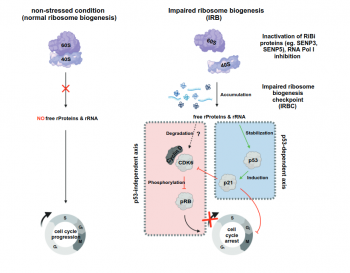08 Dec 2023 - Uncovering a novel checkpoint of impaired ribosome biogenesis
Ribosome biogenesis, a complex and highly regulated cellular process, involves the orchestrated assembly of pre-ribosomal particles to generate functional ribosomes and is coordinated by a network of trans-acting factors. Ribosome biogenesis is closely tied to cell proliferation and highly proliferating cells typically show enhanced rates of ribosome biogenesis to enable them to meet the needs for extensive and efficient protein synthesis. Disruptions can activate a cell-cycle checkpoint mediated by the tumor suppressor protein p53 that block cell cycle progression
Researchers around IBC2 Vice Director Stefan Müller investigated the role of nucleolar SUMO isopeptidases SENP3 and SENP5. Their study published in Nature Communications demonstrates that the inactivation of these isopeptidases interferes with specific steps in the assembly pathways of the 40S and 60S ribosomal subunits. Consequently, this disruption triggers the canonical p53-dependent checkpoint associated with impaired ribosome biogenesis. In addition, they further discovered that inactivation of SENP3 or SENP5 induces a novel p53-independent checkpoint. This alternative pathway converges on the downregulation of CDK6, a key regulator of the cell cycle. The findings suggest that impaired ribosome biogenesis, resulting from the inactivation of nucleolar SUMO isopeptidases, leads to the specific suppression of CDK6 through a mechanism independent of p53. Exploiting this so far unrecognized checkpoint by targeting ribosome biogenesis factors, such as SENP3 and SENP5, could thus represent a powerful strategy to inactivate CDK6 in human tumors irrespective of their p53 status.
